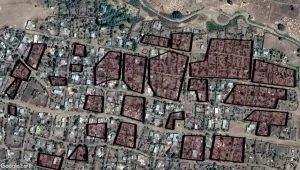With President Trump going back and forth on his own “red line,” Bolton’s arrival could pour gasoline on the fire. “The good news is that Bolton is up to speed,” one former State official says. “The bad news is he hasn’t worked in this White House.”
By Abigail Tracy
There are few foreign-policy issues on which Donald Trump has contradicted himself more thoroughly than on Syria, which he warned Barack Obama against attacking in 2013, but is now threatening to bomb, himself. “Big price to pay,” the president tweeted Sunday after reports emerged of a chemical-weapons attack in Ghouta. “President Putin, Russia, and Iran are responsible for backing Animal Assad.” On Monday, he doubled down, telling reporters at the start of a Cabinet meeting that the attack was “atrocious” and “can’t be allowed to happen.” He continued, “If it’s the Russians, if it’s Syria, if it’s Iran, if it’s all of them together, we’ll figure it out.”
The episode has thrust into stark relief Trump’s inconsistent approach to the Syrian crisis and U.S. foreign policy more broadly. Almost exactly one year ago, the president ordered a missile strike against an airbase in Syria under nearly identical circumstances, a retaliatory action that did little to deter Bashar al-Assad. (Assad and Russia both denied any involvement in the 2017 chemical attack.) The president subsequently began moving U.S. troops into Syria, but has lately been agitating publicly about pulling them back out. “He does this frequently. He puts himself out there and he builds a box around himself and then he has to commit to what he is already on the record for saying. He doesn’t speak with a lot of forethought or restraint on this and therefore it leads to some further obligation to act,” John Glaser, the director of foreign-policy studies at the Cato Institute, told me.
Inside Foggy Bottom, there is confusion over what role the State Department will play in advising the president, given that Mike Pompeo is still awaiting Senate confirmation. According to one staffer, the National Security Council has written three different policy memos on the topic, but experts at State hadn’t been consulted on them.
Trump’s contradictory strategy recalls Obama’s own 2013 “red line” on Syria, which he later ignored. “A very similar thing happened with Obama,” Glaser added, noting how the former president declared that any use of chemical weapons would precipitate a U.S. response, but ultimately backed down after Congress declined to authorize the use of military force. Trump, who was previously one of the loudest voices against intervention in 2013, now blames Obama for leaving him with the “Syrian disaster.” But according to Nicholas Burns, a former U.S. ambassador who served Bill Clinton and in both Bush administrations, Trump’s approach in Syria has more in common with Obama’s than either would likely admit. “I think that the president’s tweet yesterday was specific enough that he has effectively drawn a red line as well,” Burns told me. “I think that the president needs to respond to this.”
This leaves Trump in the same quagmire Obama said “haunts me constantly” in an interview for Vanity Fair last year. And for good reason: for years, the multi-pronged conflict in Syria has been a humanitarian crisis with no easy answer. Providing more support to rebel groups could accidentally place weapons in the hands of terrorists, prolong the war, or lead to mission creep that ends with American boots on the ground. Doing nothing empowers Assad to continue slaughtering his own people, and allows Russian and Iran to deepen their military foothold between Israel and Iraq.
So far, the Trump administration appears to be proceeding cautiously. “The first thing we have to look at is why are chemical weapons still being used at all when Russia was the framework guarantor of removing all the chemical weapons,” Defense Secretary James Mattis told reporters on Monday. “And so, working with our allies and partners from NATO to Qatar and elsewhere, we are going to address this issue.” When asked whether airstrikes against the Assad regime were on the table, the general replied, “I don’t rule out anything right now.”
Whatever red line Obama and Trump have drawn on the use of chemical weapons, it is by now so muddied by inaction—Saturday’s attack marked the eighth use of poison gas since Trump’s strike last April—that experts argue the U.S. would need to take dramatic new steps to credibly re-establish its leverage. “I actually think that it has to be much stronger and more sustained. I think we have to be careful here not to take on the Russians, you don’t want a conflict between nuclear powers,” Burns told me. “But we can go directly after Assad’s commanders and his airbases from which these attacks are launched and destroy planes on the ground and destroy part of the infrastructure of the Syrian military.”
The former ambassador added that it will be critical that the U.S. form a coalition with its U.S. allies in the Middle East and the Europeans to serve as a bulwark against Russian and Iranian aggression in the region. “We have not been responding to the chemical weapons attacks . . . obviously they thought that they could get away with it,” he said. “The real trick here is that we have to be careful because we don’t want to launch into a commitment that is so big that we get stuck in the Middle East again as we did in Iraq. If we try to take down, overthrow the Assad government, no matter how many of us would like to see Assad leave, he is not going to leave and he is in a strong position right now. But we can help the Syrian Kurds in the North, we can help the refugees, we can protect victims—or try to—of chemical weapons. We should do all those things. We should not leave the field to the Russians and the Iranians in my judgement.”
Others cautioned against another missile attack. “The last strike had no strategic or tactical utility; it didn’t help the humanitarian situation on the ground; it didn’t alter the strategic situation on the ground; it didn’t undermine the Assad regime’s control; it didn’t fight terrorism. It was really just this symbolic show, demonstrating that we are still the policeman of the world. It didn’t have any tangible impact on the conflict,” Glaser said. “We need to ask how are the means connected to the ends? Whatever tactics we use against the Assad regime in retaliation for this, how is that connected to some objective that we have? I don’t even see what the objective is other than we feel embarrassed for not acting.”
There is also the question of Trump’s executive authority to launch a military strike against the Assad regime. “President’s aren’t magically able to bomb any country that they want on their own whim. It requires legal authorization,” Glaser said. Congress was divided over whether the president had the legal authority to launch the targeted strike last April. While Senate Majority Leader Mitch McConnell and Senate Foreign Relations Chairman Bob Corker said the attack didn’t warrant an Authorization for Use of Military Force, or A.U.M.F., from Congress, which Trump did not have, others argued the opposite. “We have to think about all the consequences,” Congressman Justin Amash said at the time. “It’s critical under our system of government that these types of actions have congressional approval, because they are acts of war, and what begins as a set of strikes on one night can quickly escalate into a much broader conflict.”
Under international law, any strike launched by the U.S. against Syria would require a Security Council resolution—which it doesn’t have, and is unlikely to get. “The chances of the U.N. resolving this awful situation are basically zero,” said Richard Gowan, a U.N. expert and professor of International and Public Affairs at Columbia University. “Russia has consistently blocked Western efforts to call Assad out over chemical weapons over the last year. They are already signaling that they will hang tough this time.” What happens next, he said is inevitable: “[Nikki] Haley, the French, and the Brits will have a huge row with the Russians. They will then table a resolution demanding an investigation of the events in Ghouta. The Russians will veto it, possibly with Chinese support. Washington will then argue that the U.N. route is blocked, so it has no choice but to use force. . . . Right now, the council offers no real solutions to the endgame in Syria.”
Resolving that puzzle to Trump’s satisfaction will fall in part to national security adviser John Bolton, who began his first day in the West Wing on Monday after the departure of H.R. McMaster. “This is quite an overly full plate for the first day of a brand new National Security Adviser,” a former State Department official who knows Bolton told me. “The good news is that Bolton is up to speed on policy and knows the U.S. government well. The bad news [is] he hasn’t worked in this White House. . . . And while Bolton clearly knows the president, he hasn’t worked for him.”
It is unclear what Bolton will advise the president to do. As The New York Times notes, Bolton didn’t support a strike in Syria during the Obama administration but praised Trump’s decision last year. “I think the Trump decision to strike as they did was the correct decision,” he said at the time. “I think the limited, very precise nature of what the president did and the basis on which he did it was important.”
At the same time, Trump’s new national security adviser is a notorious hawk on Iran and Russia—and the Assad regime in Syria is a proxy for both. “It is certainly trial by fire. Walking in on your first day and having to organize and unite the U.S. government around a course of action to use military force, this is about as hard as it gets,” Burns told me. “I am someone who has traditionally had a lot of policy disagreements with John and I have worked very closely with him in the George W. Bush administration, but frankly I think his experience may pay off here for the U.S. . . . I think that John Bolton’s challenge is, can he provide that framework and sell it to the president and then can the president stick to it?
The full text of this publication is available via Vanity Fair.





